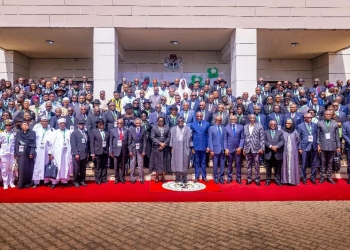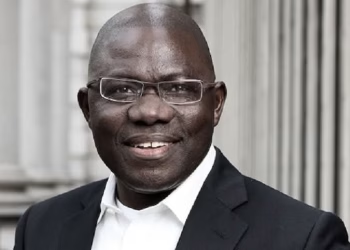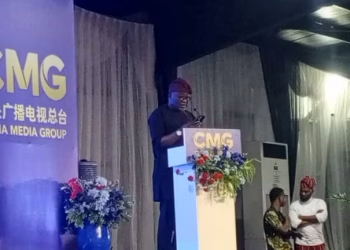The Executive Secretary of the Tertiary Education Trust Fund (TETFund), Arc. Sonny Echono has commended the Federal Government’s Students Loan Scheme, saying it will guarantee sustainable higher education and functional skills development for all Nigerian students and youths, regardless of their status or income level of their parents.
Echono who gave this commendation while delivering a paper at the 26th Seminar of the Nigerian Academy of Education titled “Funding of Tertiary Education in Nigeria”, said the interest-free loan with a moratorium which came into effect, following Presidential Assent on April 3, 2024 will provide an avenue for growing number of students to access loans at an affordable rate to enable them in paying their fees and support their education.
He alluded that the Nigerian educational landscape is on the cusp of transformation as President Bola Tinubu signs the much-anticipated students loan bill into law. This momentous legislation will revolutionize access to higher education by providing crucial financial support to Nigerian students, stressing that the Students Loan Act serves as a beacon of hope for aspiring students from all socio-economic backgrounds.
According to him, the significance of the student loan scheme, which targets primary beneficiary of education will shift the burden of payment by the students till after graduation when the graduate will be able to earn and repay the loan.
To him, the transformative role tertiary education plays in shaping an individual’s knowledge, reasoning, skills and mindset which are needed to navigate the complexities of the world and most certainly, the dynamism of our country cannot be overemphasized, stressing that tertiary education in particular, must be made to solve the social and technological needs of the society by promoting capacity building through skills acquisition, manpower training, career counseling and lifelong learning programmes that are geared towards entrenching sustainable national development.
He however said despite the tremendous growth recorded in the Nigerian tertiary education and research sphere over the years, which he attributed to the recognition of the imperative of tertiary education in achieving national priorities and developmental aspirations by key stakeholders stressed that the nation is yet to feel the desired impact of our education system in economic transformation and addressing societal challenges, hence the need for sustained transformative interventions in our tertiary education system.
Speaking on TETfund’s response to funding of tertiary institutions in Nigeria, Echono said the agency which was establishment by the Federal Government to provide intervention support towards the rehabilitation, restoration and consolidation of tertiary education in Nigeria to ensure the transformation of our public tertiary institutions has funded 5,525 physical infrastructural projects, 188 equipment fabrication, and provision of 576 faculty/departmental libraries in tertiary institutions across the country.
“TETFund has awarded grants for 19,297 Institution Based Research (IBR) projects and 912 research projects under the National Research Fund (NRF), designed to support impactful research which will contribute to national developmental efforts as well as tackle global challenges. The Fund has also sponsored and supported several research and innovation initiatives such as Research for Impact (R4i), TETFund Alliance for Innovative Research (TETFAIR), and the Innovation Fellowship for Aspiring Inventors and Researchers (i-FAIR) programmes, all targeted at deepening impactful research and uptake of research outcomes with potentials for commercialization as panacea to societal problems”.
“TETFund has also funded the procurement of 3,099,871 library books in beneficiary institutions. The Fund has also sponsored the publication of 845 titled Academic Research Journals projects, and the development of 2,307 Academic Manuscripts to Books”.
“In the area of capacity building, TETFund has sponsored 23,271 academic staff of public tertiary institutions for PhD programmes. Out of this, 4,598 were sponsored to foreign institutions, while 18,673 attended institutions within Nigeria. Likewise, 15,977 academic staff were sponsored for Master’s degree programme. 3,525 were in foreign institutions, while 12,452 undertook their studies in local institutions within the country”.
“In addition, 911 scholars were sponsored for Benchwork in foreign institutions and 872 academic staff for Post-Doctoral programme specially targeted at strengthening scientific research capacity of the country. Also, 31,071 academic staff of tertiary institutions were sponsored to attend international conferences in foreign countries, while 46,604 were sponsored for local conferences, bringing the total scholars sponsored for academic conferences to 77,675. Furthermore, 110,432 academic staff of colleges of education were sponsored to conduct supervision of teaching practice across the country”.
Echono maintained that for the Nigerian tertiary education sector to effectively play its role in human transformation and rapid development of the society, our tertiary education system must have a sustainable funding mechanism that is truly dynamic, resourceful and responsive to our national aspirations which the Fund is assiduously implementing.
“There must be deliberate efforts to ensure effective synergy between the academia, industry, and government to achieve the fundamental objectives of tertiary education for speedy socio-economic development as no nation can rise above the quality of its education”.
While calling on all relevant stakeholders to collaboratively, ensure that our tertiary educational system is effectively funded in consonance with contemporary realities and our developmental trajectory, Echono reiterated that the TETFund will remain commitment to deepening its transformative interventions to enhance the competitiveness of our tertiary institutions for sustainable national development.











